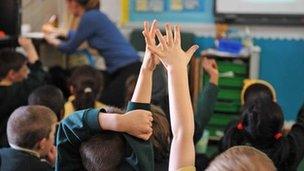Wales school banding: Ysgol Tryfan falls from 1 to 4
- Published

Schools are placed into one of five bands based on factors such as GCSE performance and attendance
The school which came top in a new system identifying educational performance in Wales has fallen into one of the lowest groups.
When it was introduced last year, Ysgol Tryfan in Bangor, Gwynedd, had the best relative score in Band 1, but has now dropped to Band 4.
The Welsh government puts secondary schools into five bands based on factors such as GCSE performance.
But Tryfan's head raised questions over a system allowing such a big change.
"Last year's results were exceptionally good and meant the school was at the top of the banding scores," said Gwyn Tudur.
"This year's drop is a disappointment, but one questions a system which allows such a big change, especially perhaps the progress measure.
"So if a school has had an exceptionally good year in 2011, they're punished for it in 2012, even though the school is close to the highest quartile according to [school inspection body] Estyn's most important measure."
BBC Wales education correspondent Nicola Smith said Ysgol Tryfan's score had fallen relative to other schools in Wales, but that did not mean it had performed significantly worse than in 2011.
This year's full banding results have been published by the Welsh government, external, and they show that the best performing school this year is Ysgol Gyfun Gymraeg Bryn Tawe in Swansea.
Schools in Neath Port Talbot performed well with six of its 11 schools placed in Band 1 while the rest were in Bands 2 and 3.
It is the second year the Welsh government has revealed the bands measuring schools against each other as part of an attempt to raise standards.
The banding results allow parents and teachers to see how their school is performing, relative to others in their area and across Wales.
Factors such as attendance rates, GCSE results and whether pupils do as well as expected are taken into account. The system also looks at how many children receive free school meals to recognise family backgrounds.
Ministers insist banding is not meant to name and shame schools, and it is not as "crude" as league tables.
But union leaders have said the banding system will always prove to be divisive for schools.
Education Minister Leighton Andrews said: "The robust data released today gives us and parents a clear picture of how our schools are performing and provides us with the information we need to challenge schools who are not delivering for our young people in Wales.
"It is encouraging to see the number of schools in Bands 4 and 5 last year making real progress on improving the percentage of pupils achieving level 2 (GCSEs grades A*-C) including English/Welsh first language and mathematics.
"At Band 4 we've seen the percentage go from 41.7% to 46.5% and at Band 5 we've seen the percentage go from 36% to 41.8%.
'Significant achievement'
"Sixty-one out of 79 Band 4 and 5 schools last year saw improvements in the percentage of pupils achieving the level 2 English/Welsh first language and mathematics. This is a significant achievement.
"I have made a clear commitment to raising standards and performance in schools in Wales, improving levels of literacy and numeracy and reducing the impact of poverty on educational attainment.
"Banding is at the heart of our school improvement agenda in Wales and we're committed to releasing this performance data year on year."
Teaching unions are reiterating calls for banding to be scrapped
A formula is used to produce a score for all 219 state secondary schools in Wales.
They are then placed into one of five bands, with the best performers in Band 1 and those that need to improve in Band 5.
It is designed to reflect whether schools are making improvements relative to each other.
That means a school could move down a band, even though its results have stayed the same. Positions could change because other schools have made bigger improvements.
Last year schools in Bands 4 and 5 were offered £10,000 to improve their performance. The Welsh government has not yet decided whether extra funding will be available this year.
Banding for primary schools has been delayed until 2014.
- Published18 December 2012
- Published18 December 2012
- Published23 August 2012
- Published17 May 2012
- Published20 February 2012